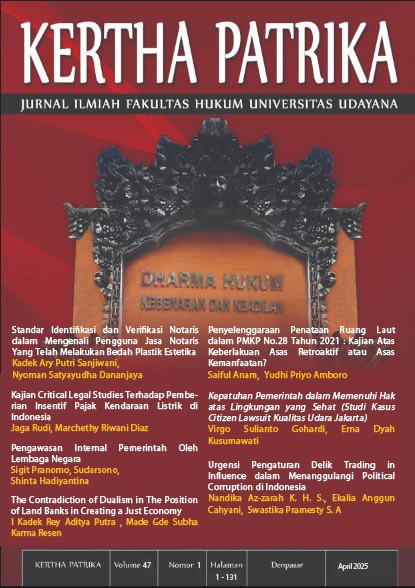The Contradiction of Dualism in The Position of Land Banks in Creating a Just Economy
Abstract
This study aims to examine the contradiction of the dualism of the position of land banks in creating a just economy based on a comprehensive analysis of the provisions of the Job Creation Law and its derivative rules. This paper uses normative research methods with a literature, conceptual and comparative approach. The results of the study show that Land Banks has two positions, namely as a representative of the state and an implementer of business activities. The dualism of this position is contradictory because on the one hand it must carry out the function of public service and on the other hand consider the orientation of profit. Based on a study of the substance of the regulation of the formation of land banks, its position as the executor of business activities that are full of economic interests has a tendency to dominate more. The tendency that can be seen from the arrangement of land banks is in the form of siding with the capitalists who own capital without any effort to guarantee the rights of indigenous peoples as marginalized parties. This results in the existence of land banks ignoring efforts to create the greatest possible prosperity for the people as mandated by the constitution which should be a limit on the meaning of the right to control the state. In the end, the equitable economy that was proclaimed as the initial goal of establishing a land bank could not be achieved.
Downloads
References
Bagir Manan. Menyongsong Fajar Otonomi Daerah. Cetakan III. (Yogyakarta: PSH FH UII Press, 2004).
Gijssel, J. Hoecke, M.V. Apakah Teori Hukum Itu (Terjemahan B. Arief Sidharta). (Bandung: Fakultas Hukum Universitas Parahyangan., 2000)
Harsono, Boedi. Hukum Agraria Indonesia: Sejarah Pembentukan Undang-Undang Pokok Agraria Isi dan Pelaksanaannya, (Jakarta: Djambatan, 2008).
Sitorus, N. Nomadyawati. Hak Atas Tanah dan Kondominium. (Jakarta: Dasamedia Utama, 1994)
Ter Haar. Asas-asas dan susunan hukum adat. (Jakarta: Pradnya Paramitha, 1974).
Journal
Ahilote, dkk. “Pengawasan terhadap Bank Tanah: Urgensi, Kewenangan, dan Mekanisme”. Undang: Jurnal Hukum 4 No. 1. (2021).
Dwisvimiar, I. “Keadilan dalam Perspektif Filsafat Ilmu Hukum”. Jurnal Dinamika Hukum 11, No. 3. (2011)
Erdiana N., Budi S., Mujiono H.P. “Eksistensi Bank Tanah Terkait Pengadaan Tanah Berdasarkan Undang-Undang Cipta Kerja”, Notarius 14, No. 2 (2021)
Ganindha, R. “Urgensi Pembentukan Kelembagaan Bank Tanah Sebagai Alternatif Penyediaan Tanah Bagi Masyarakat Untuk Kepentingan Umum”. Jurnal Arena Hukum 9, No. 3 (2016).
Kafrawi dan Kafrawi, R.M. “Kajian Yuridis Badan Bank Tanah dalam Hukum Agraria Indonesia”. Perspektif Hukum 22, No. 1. (2022).
Rejekiningsih, T. “Asas Fungsi Sosial Hak Atas Tanah Pada Negara Hukum (Suatu Tinjauan Dari Teori, Yuridis, dan Penerapannya di Indonesia)”. Yustisia 5. No. 2. (2016). Roestamy, M. “Pengadaan Tanah Dalam Perspektif Sosiologi Hukum”. Jurnal Ilmiah Living Law 9, No.1 (2017).
Suliantoro, B.W. Runggandini, C.W.M. “Konsep Keadilan Sosial dalam Kebhinekaan Menurut Pemikiran Karen J. Warren”. Respons 23. No. 1. (2018)
Syofyan, A. “Perlindungan Hak-Hak Masyarakat Adat Menurut Hukum Internasional”.
Fiat Justitia Jurnal Ilmu Hukum 6. No. 2. (2018).
Wardhani, D.K. “Disharmoni Antara RUU Cipta Kerja Bab Pertanahan dengan Prinsip- prinsip UU Nomor 5 Tahun 1960 tentang Peraturan Dasar Pokok-Pokok Agraria (UUPA)”. Jurnal Komunikasi Hukum (JKH) Universitas Pendidikan Ganesha 6, No. 2. (2020).
Wibowo, S. “Memahami Makna Pasal 33 Undang-Undang Dasar Negara Republik Indonesia Tahun 1945 Perihal Penguasaan Oleh Negara Terhadap Sumber Daya Alam.” Fungsional Perancang Peraturan Perundang-Undangan. Mataram: Kantor Wilayah Kementerian Hukum dan HAM. (2015).
Zahra, F.A. Melacak Landasan Hukum Pengelolaan Aset Tanah Negara melalui Konsep Bank Tanah. Al-Ihkam 12, No.2 (2017).
Laws and Regulations
Undang-Undang Dasar Negara Republik Indonesia Tahun 1945. Undang-Undang Nomor 11 Tahun 2020 tentang Cipta Kerja.
Undang-Undang Nomor 2 Tahun 2012 tentang Pengadaan Tanah Bagi Pembangunan Untuk Kepentingan Umum.
Undang-Undang Nomor 41 Tahun 2009 tentang Perlindungan Lahan Pertanian Pangan Berkelanjutan.
Undang-Undang Nomor 5 Tahun 1960 tentang Peraturan Dasar Pokok-Pokok Agraria
Putusan Mahkamah Konstitusi Nomor 21-22/PUU-V/2007 tentang Pengujian atas Undang-Undang Nomor 25 Tahun 2007 tentang Penanaman Modal.
Website
Amindoni, Ayomi. “Masyarakat Adat Besipae di NTT yang ‘digusur’ dari Hutan Adat Pubabu: Anak-anak dan Perempuan ‘trauma’ dan ‘hidup di bawah pohon”, Agustus, 20, 2020, https://www.bbc.com/indonesia/indonesia-53839101 (diakses 12 Oktober 2023). Anonim. “Sertifikasi Tanah di Bali Temui Kendala” 30 Maret 2011, https://regional.kompas.com/read/2011/03/30/19344724/~Regional~Indonesia%20Timu r (diakses 12 Oktober 2023).
Kementerian Keuangan Republik Indonesia. “Model Bisnis Bank Tanah di Indonesia Guna Percepatan Pembangunan”. Jakarta Pusat: 2016.
https://www.djkn.kemenkeu.go.id/artikel/baca/10609/Model-Bisnis-Bank-Tanah-Di- Indonesia-Guna-Percepatan-Pembangunan.html (diakses 15 Oktober 2023).











